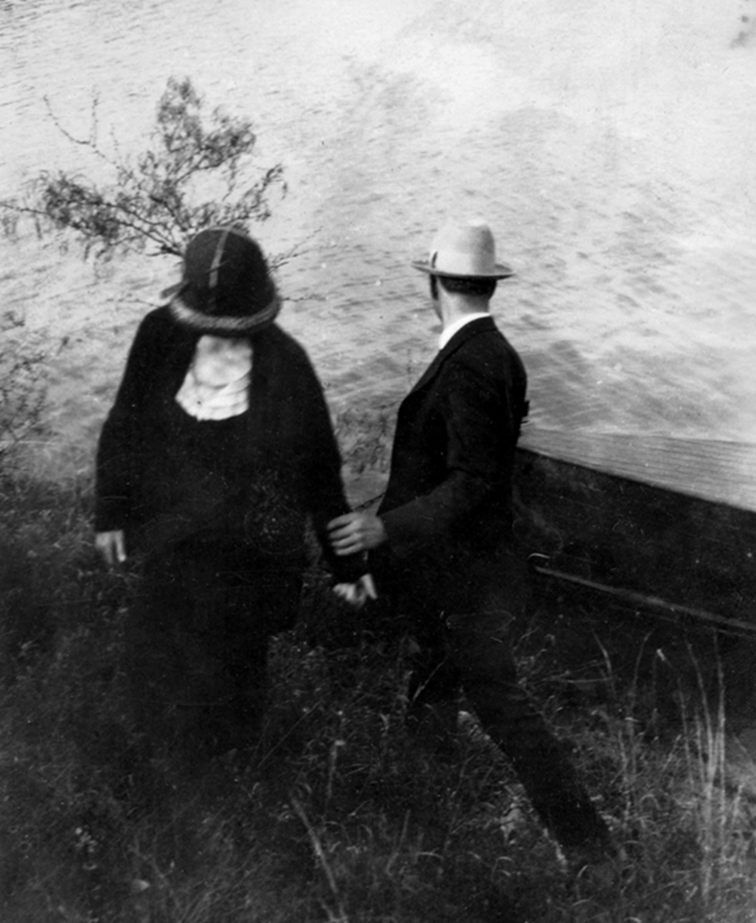Saturday, October 28, 1967
The Journal of Eleanor Blythe
Frost silvered the library steps on Saturday morning. The north wind rattled the shutters before the building even opened. Miriam Finch arrived with her coat pulled tight and her breath clouding the air. One sign had already come, though she did not yet name it so.
She returned to the map room where the package still waited. The brittle journal drew her first. Its pages were softened by water, the ink blurred into stains. Yet in places words held steady. She copied what she could into her ledger. Some sentences surfaced clearly: a note about the river’s strange light, a memory of a schoolroom, a list of berries. Whole stanzas resisted, sliding into nothingness. But one poem emerged whole, as if saved for her:
On the inside of the back cover she found stitches in the binding and the hint of a page that had been hidden there. The stitched paper covering had pealed back, and she noticed a sheet behind and gently removed a few more stitches and pulled it out. She unfolded it and found a poem. The words had survived:
To you who find this just in time,
When the world begins to shake,
Know we did not vanish here,
But other form did take.
The river is no place at all,
It flows outside of time,
A tuning of the breath it holds,
A bending light to rhyme.
A hidden door lies out of sight,
Behind the shimmering veil,
It shows itself when seeking ends,
When searching hands must fail.
It calls not by the name you bear,
But resonance alone,
A threshold softly opens wide,
A path that will be shown.
When current calls, the choice is yours,
To cross or else to stay:
Step through if heart consents to go,
Or turn your face away.
First Northwind, then October frost,
These four in order be:
Fifth bell tolls at dark edge of dusk,
Then enter the Hollow Tree.
— E.E.B.
She copied what she could into the ledger, whispering the phrases as she wrote them so the room could hold them too.
The careful repetition steadied her. It felt like an incantation.
First Northwind, then October frost,
These four in order be:
Fifth bell tolls at dark edge of dusk,
Then enter the Hollow Tree.
She traced the lines with her finger. The ink had once been violet. At the bottom of the page, written in the same hand, was a note: Vincent believed in return. I never did. But if you are reading this, perhaps I was wrong. — E.E.B.
Eleanor Exquisite Blythe. Miriam felt the name as if it had been whispered directly into her ear. The brittle journal had belonged to her.

Miriam laid the journal aside and unwrapped the river photograph. The couple stood with their backs half-turned, Vincent’s fingers brushing Eleanor’s wrist, her face hidden. She opened the folder of clippings. Headlines from 1923 spilled across the desk: Schoolteacher Disappears at River. Local Man Missing, Presumed Drowned. Reports of Eleanor Blythe and Vincent Harrow, last seen walking toward the water on the final Sunday of October. The air had been glass-clear. A boy, Silas Finch, had trailed them with his new birthday camera. He caught a single image: Eleanor stepping forward, her hand extended, Vincent’s hand barely touching hers. Neither looked back. Neither returned.
Rumors had gathered like leaves. Some claimed they drowned. Others swore they boarded a train under false names or fled overseas. Yet those who had sat in Eleanor’s schoolroom, or listened to Vincent’s quiet voice, whispered of another possibility. They called it the River Pact. They said a journal described how two people could step into the current under certain conditions, pass into another realm and not return to this world at all.
Miriam placed the photograph beside the poem. The current of meaning joined them. Northwind. Frost. The bell. The Hollow Tree. Signs written decades earlier now seemed to wait for her. She copied them once more into her ledger, whispering the words aloud as if to anchor them in the walls.
When dusk came she lingered in the map room long after the library closed. She read the poem again, read the clippings, studied the photograph. Her breath fogged the lamplight.
The folder, the journal, the photograph, the film canister labeled do not rewind, the photo album - together they told her this much: Eleanor and Vincent had not drowned. They had walked into the water and been read by it, as if the river itself had become a threshold into another realm.
Before leaving, she placed all of the items back into the box. She turned out the lamp. As she locked the library door behind her, Miriam paused on the library steps. She realized she had not only inherited her father’s silence, but he also bequeathed a story that had begun long before her birth, one that had chosen her to carry it forward.
She pulled her coat tighter, clutching the keys in her fist. She knew she had only begun to unravel the mystery.
That night the north wind arrived — a blue norther, sudden and sharp. It rattled the shutters, scattered leaves down Main Street, whistled through every gap in the windows. Miriam pulled her coat close and walked home. The sound of the wind followed her into sleep.
In her dream she stood again at the edge of the grove. The Hollow Tree glowed. A woman in black stood half-turned at its mouth, as though recognizing Miriam for the first time. Her face remained hidden, yet Miriam knew her. Eleanor. The dream held her until the bells began to toll, one after another, carrying her awake.
She sat up with the words echoing still, unsure if she had read prophecy, poem, or command.
Three signs already stirred. Only the bell remained.
To be continued…
Filed under: #ExquisiteFamilyRecords, #EleanorBlythe, #SilasFinch, #MiriamFinch #Bellweather, #HollowTree, #Poetry #VincentHarlow, #disappearence, #1923, #1967



